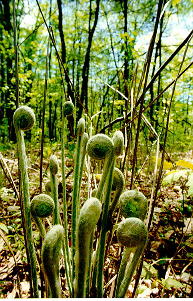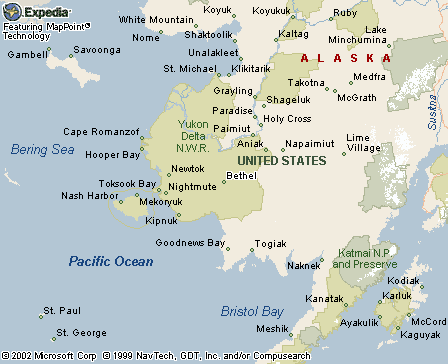|
|
Canku Ota |
|
|
(Many Paths) |
||
|
An Online Newsletter Celebrating Native America |
||
|
June 15, 2002 - Issue 63 |
||
|
|
||
|
Nutritionist Shares Knowledge of Traditional Plants |
||
|
by Angela Denning-Barnes, The Tundra
Drums
|
||
|
|
|
Gregory tells them they can eat the hard, black plant if they're in a pinch and there's no other food available. Gregory learned the wisdom from her mother during family hunts for tundra plants every spring and summer. "Elders say, in the summertime when everything is plentiful, take advantage and gather food to eat," Gregory said. After working as a Yup'ik Native nutritionist for the Yukon-Kuskokwim Health Corp., Gregory is considered a local expert on the nutritional and medicinal values of tundra plants. "She is very knowledgeable about plants," said Gerri Sumpter, coordinator of continuing education at the University of Alaska Fairbanks Kuskokwim campus in Bethel. "When I ask other people about plants, they say, Oh, no, Mary's the one to ask.' " Gregory has shared her knowledge with the public for 10 years by guiding tundra walks every spring and fall through the university. She also guides private tundra walks for $25 per person. Gregory took her last group on May 30 to gather fiddlehead ferns, anqukaaq (or wild rhubarb), ulevleruyiit (or beech greens) and other ripe tundra goodies. Participants nibbled on greens or young, minty leaves from the river and yellow willow trees. Gregory talked about the healing value of caggluk, also known as wormwood or stinkweed, and showed students how to identify good rye grass for basket weaving. "This is all food here," Gregory said as she motioned to the greenery lining the roadside. "They're all food to live off of. There's lots of things to eat all over Bethel, even in your front yard. And you don't have to grow them." Eating tundra vegetation is a healthy Yup'ik Eskimo tradition that began declining when non-Natives moved into the region and brought with them processed food, usually heavy in salt and sugars, Gregory said. Fatal illnesses such as cancer increased among elders with the introduction of foreign foods, she said. The healthy benefits of hunting plants outweigh the work, said Gregory. "Gathering plants is a hard thing. We have to go around to many different kinds of terrain," Gregory said. "But see, we are getting exercise and we are breathing fresh air."
|
|
|
||
|
|
||
| Canku Ota is a free Newsletter celebrating Native America, its traditions and accomplishments . We do not provide subscriber or visitor names to anyone. Some articles presented in Canku Ota may contain copyright material. We have received appropriate permissions for republishing any articles. Material appearing here is distributed without profit or monetary gain to those who have expressed an interest. This is in accordance with Title 17 U.S.C. section 107. | ||
|
Canku Ota is a copyright © 2000, 2001, 2002 of Vicki Lockard and Paul Barry. |
||
|
|
|
|
|
The "Canku Ota - A Newsletter Celebrating Native America" web site and its design is the |
||
|
Copyright © 1999, 2000, 2001, 2002 of Paul C. Barry. |
||
|
All Rights Reserved. |
||

 Bethel,
AK - With a green scarf tied at her chin and rubber boots on her feet,
Mary Gregory stands on a hillside of tundra, holding a handful of dark
moss so her students can identify survival food.
Bethel,
AK - With a green scarf tied at her chin and rubber boots on her feet,
Mary Gregory stands on a hillside of tundra, holding a handful of dark
moss so her students can identify survival food.
